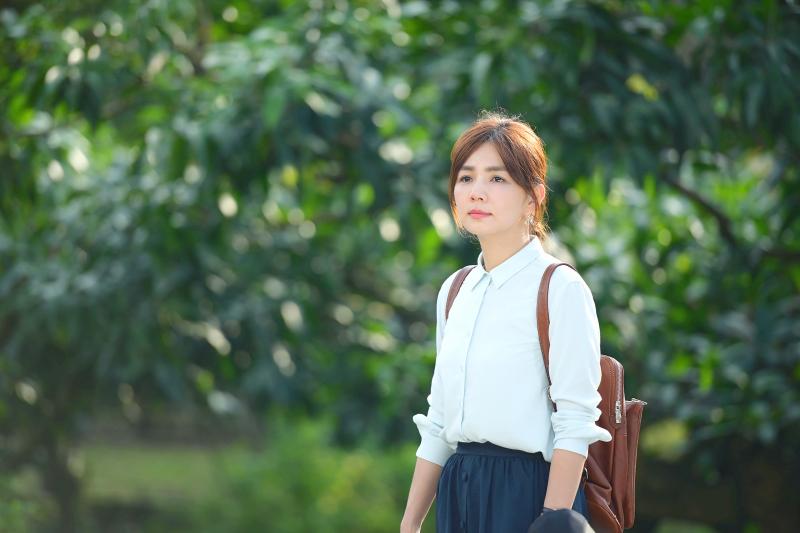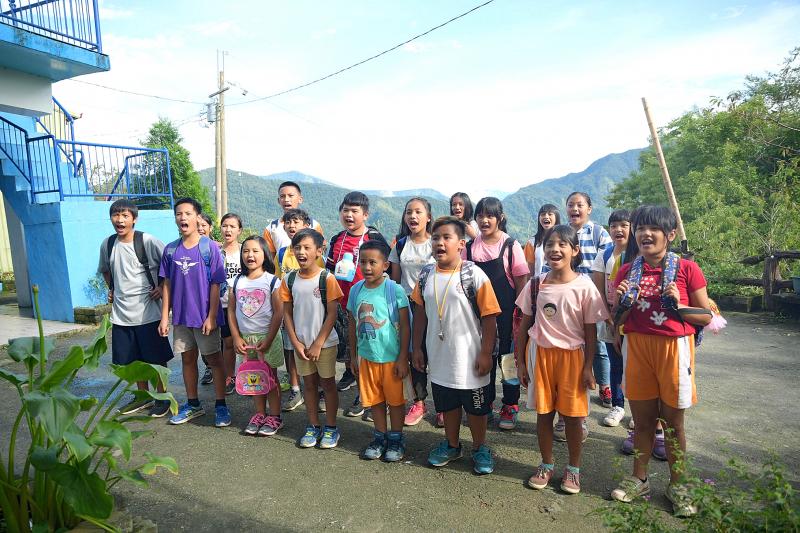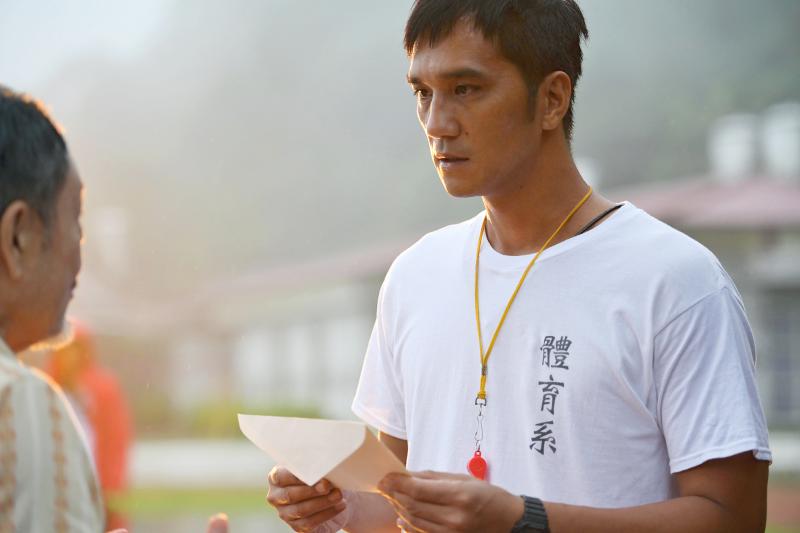Listen Before You Sing (聽見歌再唱) employs almost every device from the handbook of heartwarming and inspirational drama. While it works — as evidenced from the sniffles in the theater — it also results in a cliched and predictable production, albeit one that is hard to dislike.
It’s even more moving that the plot is based on the true story of Aboriginal Bunun educator Bukut Tasvaluan and his Vox Nativa choir, which went from a ragtag group to a highly acclaimed outfit showcasing Aboriginal culture and singing techniques while fostering pride and confidence in its members. They have won numerous awards, and their signature Let’s Clap Together was featured in the late Chi Po-lin’s (齊柏林) 2013 Golden Horse winning documentary Beyond Beauty: Taiwan from Above (看見台灣) and has since been performed across the world.
First-time feature director Yang Chih-lin (楊智麟) made a documentary on the subject in 2009, and spent the next decade trying to dramatize the tale (part of the struggle was getting Bukut’s approval). It is set in a modern day remote Bunun village, whose elementary school is in danger of closing due to rural flight and the nation’s plummeting birth rate. The school must demonstrate that it has “special characteristics” to stay open, and one might cringe and question where this film is going when a Han Taiwanese teacher suggests, “Aborigines are good at singing, why don’t we have them form a choir and participate in some national competitions?”

Photo courtesy of Warner Bros
The kids immediately defy the stereotypes and prove to be terrible, and Teacher Fang (Umin Boya, a fictional Bukut), who volunteered to lead the choir, is a sports teacher who cannot read music.
The issue of culture loss among the younger generation in these communities is a serious one, and Bukut is seen speaking to elders in Bunun and children only in Mandarin. It’s puzzling at first that the song they choose for their first competition is Mayday’s Mandarin ballad Contentment (知足), but this actually serves to heighten the contrast to their later journey of rediscovering their traditional ways and pride. This transition, however, is a bit abrupt and hard to believe — Aboriginal languages wouldn’t still be struggling to survive if you could get a group of children to start speaking them just like that — but ultimately the message is positive and encouraging, especially to young Aboriginal viewers.
It’s the same problem with the many other plot devices in the film Yang uses for dramatic effect and emotional impact. People don’t change overnight, but everyone seems to do so in this film as their conflicts are resolved instantly somewhere off screen. The dad (Bokeh Kosang) who has a grudge against Bukut and disapproves of the choir suddenly becomes their biggest supporter, and so on.

Photo courtesy of Warner Bros
With nobody actually knowing how to run a choir, it takes itinerant substitute music teacher Ms Huang (Ella Chen, 陳嘉樺) who knows nothing about Bunun culture, to swoop in and save the day. It isn’t clear whether this happened in the real story and Huang, who is unable to secure a full-time job, is also somewhat of an underdog, but this risks falling into the colonial trope of Han people bringing their “advanced” knowledge to “civilize” the Aborigines.
Fortunately, Huang differs from the other one-dimensional, responsibility-shirking Han teachers, who seem to have learned nothing about local culture during their time there. Her character should have been fleshed out more, but at least she doesn’t act like a savior and doesn’t end up as the hero. The whole process is actually quite collaborative with both teachers fully considering the students’ input, and that’s what Taiwan’s education should be like. However, Chen, who is better known as a singer, delivers a less than satisfactory performance.
The child actors, on the other hand, are wonderfully convincing and believable as actual members of the Vox Nativa choir. Their performances are nuanced and natural, and their brilliance alone is enough to make one overlook the other flaws in the film. The production, especially of their performance scenes, is superb, and their voices will linger in the audience’s mind long after the curtain falls.

Photo courtesy of Warner Bros
Despite its flaws, this film is just what it purports to be: a highly mass-appealing tale of inspiration and cultural awakening that brings attention to a Taiwanese success story that’s worth telling.

Jacques Poissant’s suffering stopped the day he asked his daughter if it would be “cowardly to ask to be helped to die.” The retired Canadian insurance adviser was 93, and “was wasting away” after a long battle with prostate cancer. “He no longer had any zest for life,” Josee Poissant said. Last year her mother made the same choice at 96 when she realized she would not be getting out of hospital. She died surrounded by her children and their partners listening to the music she loved. “She was at peace. She sang until she went to sleep.” Josee Poissant remembers it as a beautiful

Before the last section of the round-the-island railway was electrified, one old blue train still chugged back and forth between Pingtung County’s Fangliao (枋寮) and Taitung (台東) stations once a day. It was so slow, was so hot (it had no air conditioning) and covered such a short distance, that the low fare still failed to attract many riders. This relic of the past was finally retired when the South Link Line was fully electrified on Dec. 23, 2020. A wave of nostalgia surrounded the termination of the Ordinary Train service, as these train carriages had been in use for decades

March 2 to March 8 Gunfire rang out along the shore of the frontline island of Lieyu (烈嶼) on a foggy afternoon on March 7, 1987. By the time it was over, about 20 unarmed Vietnamese refugees — men, women, elderly and children — were dead. They were hastily buried, followed by decades of silence. Months later, opposition politicians and journalists tried to uncover what had happened, but conflicting accounts only deepened the confusion. One version suggested that government troops had mistakenly killed their own operatives attempting to return home from Vietnam. The military maintained that the

Lori Sepich smoked for years and sometimes skipped taking her blood pressure medicine. But she never thought she’d have a heart attack. The possibility “just wasn’t registering with me,” said the 64-year-old from Memphis, Tennessee, who suffered two of them 13 years apart. She’s far from alone. More than 60 million women in the US live with cardiovascular disease, which includes heart disease as well as stroke, heart failure and atrial fibrillation. And despite the myth that heart attacks mostly strike men, women are vulnerable too. Overall in the US, 1 in 5 women dies of cardiovascular disease each year, 37,000 of them